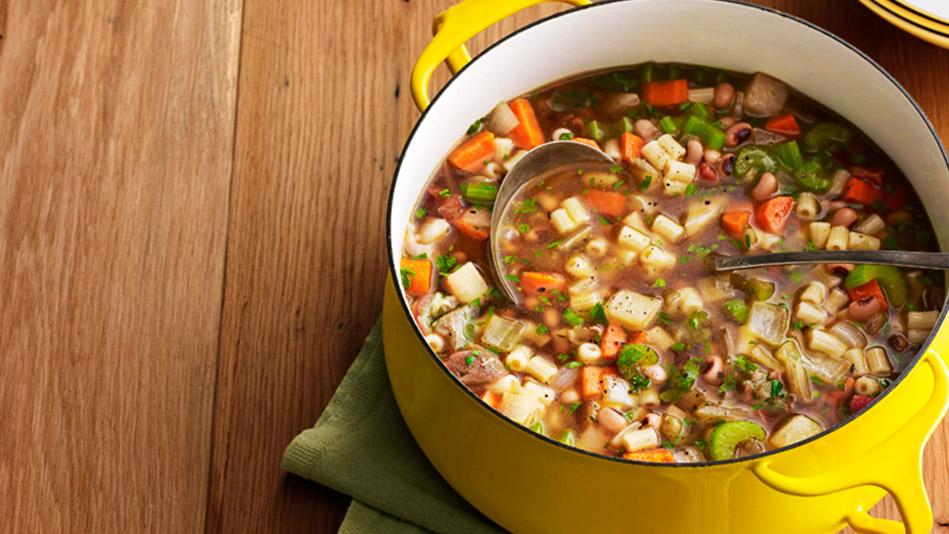January is National Soup Month, a time to celebrate this beloved comfort food. January was designated National Soup Month by Campbell’s Soup Company in 1984. The best selling soup in the United States is chicken noodle, with tomato as a close second, clam chowder, potato, and minestrone are third, fourth, and fifth. Tomato was the first soup that Campbell’s produced in 1897, the perfect combination with a grilled cheese sandwich. Campbell’s invented condensed soup, introducing it to the world, also in the year 1897.
According to AARP, women are twice as likely to order soup for lunch than men. Americans eat more than ten billion bowls of soup each year. The earliest archeological evidence of soup dates back to 6000 BC and it was hippopotamus soup.
The American Medical Association considers soup a valuable food source because it keeps you full and hydrated in the winter months when it might be harder to get your daily water intake, soup basically waters your body. It also signals your brain that you are full and satisfied. Many ingredients in soup help your body fight off colds and flu, think garlic and other healing herbs in a hearty broth. The liquid consistency can stimulate your digestive tract, the fiber in soups can help keep your digestive system healthy. Soups warm your stomach and can clear nasal passages. Some soups, like tomato are rich in antioxidants, which can help neutralize harmful cell damaging molecules.
My Dad made soup every Saturday beginning in the fall. He had a soup pot that was so big that we would climb in while playing hide and seek. He would stew whole chickens with herbs and veggies all day long. Dad would then strain the bone broth and freeze huge batches for soup making. The roux came next, for the cream soups, pounds of butter, cream, white pepper, and flour. The word bisque was used by my Mom to describe my Dad’s fish soups with their velvety texture, wine, and cream. Big chunks of chicken, carrots, onions, celery, garlic, and peas with thick pasta were the elements in his chicken noodle soup. After visiting a friend’s house for lunch, I learned about Campbell’s soup and would beg my Mom to buy Chicken and Stars soup at the grocery store. Little did I know then that my Dad’s soups were actual health powerhouses with the amount of garlic and onions in the stock. The stewed chickens provided the nine essential amino acids, the building blocks of protein needed in the human diet, and the vitamins and minerals for bone health and brain function.
Beyond its health benefits, my Dad’s soup was an act of love, a symbol of connection, prepared with intention. Preparing soup was like a meditation for my Dad, the process of selecting the recipe, combining elements of the earth, tending to the pot, all to create something nourishing. Sharing that soup fostered a sense of togetherness.
My Mom did indulge my desire for the canned chicken and stars soup. I thought it was delicious until I had a bowl of the homemade, beautiful, and rich soup created by my Dad. The Campbell’s soup’s veggies were tiny, the chicken in small cubes, no visible herbs such as basil, rosemary, or sage, just a salty taste.
In the fall of my first year here (1987) on the Eastern Shore, I began to notice signs at local churches advertising “Soup Day.” I thought “soup day” was a charitable activity for those less fortunate, until I saw the “soup line” of fashionably dressed professionals. I learned that homemade soup made by church volunteers for “soup day” was a special monthly offering that citizens looked forward to, marked on calendars. Churches carefully guarded their recipes, each known for their “special” soup. It was at “soup day” that I had my first dry Lima bean soup, an absolute favorite. We could “carry out” the soup or eat at long tables in the church’s fellowship hall. After COVID, there are very few “soup days” here in Cambridge, I miss it.
Soup making isn’t easy but it is definitely worth it. Between shoveling the walk and bingeing Netflix during last week’s snowstorm, I made a pot of Dry Lima bean soup. I was given the recipe by the head of the soup making team at Christ Episcopal Church, years ago when I volunteered at “soup day.” It wasn’t great, definitely not the soup that I had remembered, my chickens enjoyed it though. I’ll keep making soup, it feeds my soul, and my kitchen smells amazing.
Kate Emery General is a retired chef/restaurant owner who was born and raised in Casper, Wyoming. Kate loves her grandchildren, knitting, and watercolor painting. Kate and her husband, Matt are longtime residents of Cambridge’s West End where they enjoy swimming and bicycling.



Write a Letter to the Editor on this Article
We encourage readers to offer their point of view on this article by submitting the following form. Editing is sometimes necessary and is done at the discretion of the editorial staff.